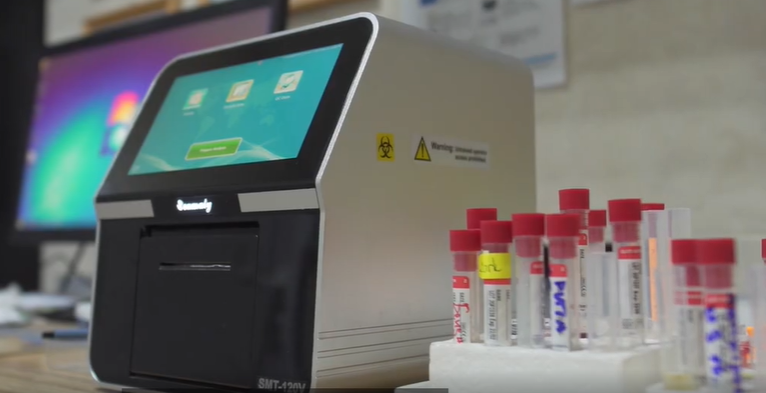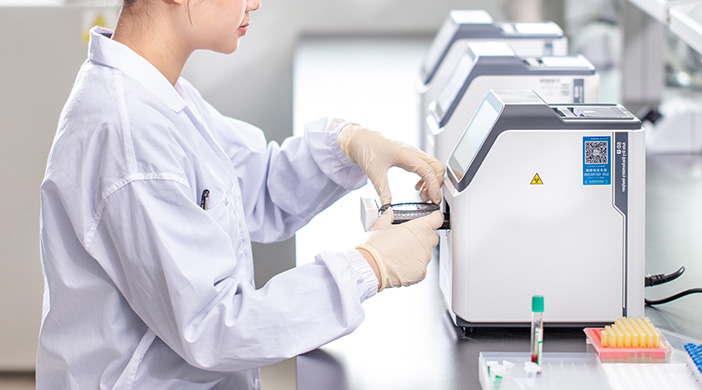What is a biochemical testing?
A biochemistry test is a
biochemistry analyzer that measures the levels of enzymes, proteins, lipids and other metabolites in the blood to determine the function of various systems and organs.
What are the items of biochemical indicators?
The following are some of the indicators that are often used by veterinarians in clinical diagnosis of diseases.
Alanine aminotransferase (ALT), aspartate aminotransferase (AST), urea nitrogen (BUN), creatinine (CREA), total protein (TP), albumin (ALB), total bilirubin (TBIL), glucose (GLU), calcium (Ca), phosphorus (P), alkaline phosphatase (ALP), and amylase (AMY).
Let's take a brief look at the clinical significance of each of these indicators~

-
1. TP (total protein): protein content of the animal's blood, dehydration, liver and kidney disease or gastrointestinal disorders can make this indicator abnormal
-
2 GLOB (globulin): high globulin represents chronic inflammatory diseases, such as heartworm, viral, parasitic or bacterial infections
-
3. ALB (albumin): synthesized by the liver, liver disease, kidney disease, dehydration, gastrointestinal disease or parasites can cause protein abnormalities
-
4. ALKP (Alkaline phosphatase): an index of liver function (biliary system) in animals, which rises significantly when the liver (bile duct) is partially diseased.
-
5. ALT (alanine transferase): diagnostic index of liver disease in dogs and cats, will be significantly elevated when the liver is damaged or liver disease
-
6. GGT (r-glutamine transpeptidase): liver indicator function
-
7. TBIL (total bilirubin): used to assess anemia and biliary system disease
-
8. BUN (blood urea nitrogen): produced by the liver and eliminated by the kidneys, it is one of the kidney indicators, sometimes other causes (dehydration, liver disease, diet) can also make it rise
-
9. CREA (creatinine): muscle metabolites, eliminated by the kidneys, can rise in kidney disease or urinary tract obstruction
-
10. PHOS (Phosphorus): a rising phosphorus value is an indicator of kidney disease, especially end-stage kidney disease
-
11. GLU (glucose): blood glucose concentration, which can be abnormal if the animal is in poor health or sick (e.g., diabetes)
-
12. Ca (calcium ion): a variety of diseases such as lactation disorders, nutritional disorders, tumors and other diseases can cause abnormal indicators
-
13. CHOL (cholesterol): this indicator will increase when there is liver and kidney disease or endocrine abnormalities
-
14. TBIL (total bilirubin): used to assess anemia and biliary system diseases
-
15. AMYL (pancreatic amylase): an indicator of pancreatic disease, usually measured together with LIPA (pancreatic lipase) to assess pancreatic disease
-
16. LIPA (pancreatic lipase): Indicator of pancreatic disease
When do we need biochemical testing on our pets?
1. Health check-up
All healthy dogs and cats, especially older dogs and cats, should have a physical examination at least once a year. In conjunction with other examinations, potential diseases can be detected as early as possible and treated in time to prevent the disease from developing in a serious direction.
2. Pre-surgical examination
The anesthetic used for surgery is generally very safe. However, the risk of anesthesia is elevated in young, old, and sick animals, especially when the animal has abnormal function of major organs. The results of biochemical examinations can reflect the health status of the animal at the time and whether it is appropriate to perform the surgery.
3. In case of illness
When there is a suspected problem with the heart, liver, kidneys, pancreas and other systems, biochemical tests are needed for evaluation. During the treatment process, biochemical tests are also needed to confirm the recovery of the body. Afterwards, you should also follow the doctor's instructions for regular review.



